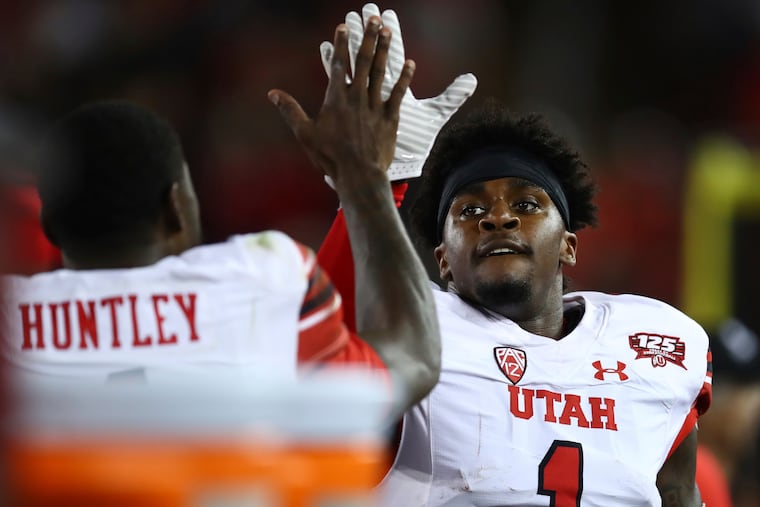Eagles say their draft strategy won’t include hope when it comes to players with checkered injury histories
After two injury-infested seasons, the Eagles say they're staying away from medical risks in this week's draft.

Twice this offseason, Eagles general manager Howie Roseman has told us that hope is not a strategy. He wasn’t referring to the coronavirus pandemic. He was referring to the team’s new approach toward bringing in players who are injury risks.
“The last two years, injuries have really hurt our football team,’’ he told reporters in January shortly after the Eagles’ wild-card playoff loss to Seattle. “We have to figure out a way to get better here [with injuries].
“We can help from a front-office perspective by looking at the players that we bring in. Hope is not a strategy when it comes to injuries. When you bring in guys that are injured, it obviously increases the risk that they will get hurt again.’’
Seven weeks later, at the NFL scouting combine in Indianapolis, Roseman repeated the message.
“What we’ve learned from the last couple of years is that hope isn’t a strategy,’’ he said. “We have to learn from the past and maybe for a period of time, kind of go back to studying, especially when we have new people here [on our medical and training staffs], and figuring out what we’re good at figuring out; what kind of injuries are we good at figuring out.
“As we look at this offseason and this draft class, the amount of resources that we put on those particular guys will be very little.’’
It’s highly unlikely that the stay-at-home circumstances of the last seven weeks, with the cancellation of pro days and personal visits and medical rechecks, have softened Roseman’s resolve to stay away from players with checkered medical pasts in this week’s draft. But we’ll see.
The Eagles’ medical and training staffs have undergone a major renovation in the last 12 months. They have a new chief medical officer (Arsh Dhanota), a new director of sports medicine (Tom Hunkele) and a new director of sports performance (Ted Rath).
And while Roseman obviously has a lot of confidence in all of them, the fact of the matter is the Eagles, like every other team in the league, probably have less of a handle on this draft class than any in the last 50 years because of the pandemic restrictions.
“You take all of the information you have and make the best decisions you can based on the data that you have," said Roseman’s top scout, Andy Weidl, the Eagles’ vice president of player personnel. “We really trust and rely on our medical staff. It’s a case-by-case situation. Everybody recovers differently.’’
There are few “clean’’ players in this draft. Football is a violent and unnatural game. Players get hurt, many seriously.
What teams must figure out is what a player’s injury past tells them about his future. Has he completely recovered from his previous injuries? Does he have degenerative issues that could shorten his career? How predisposed to injury is he? Will he miss more games than he plays? Can he play hurt, or is he only effective when he’s fully healthy?
Only the Eagles know what their draft board looks like right now. Only they know which players they already have eliminated or downgraded because of medical issues. None? Some? A lot?
Two wide receivers who could be on their radar in the first round – Arizona State’s Brandon Aiyuk and Colorado’s Laviska Shenault – have had recent surgery to repair core muscle injuries. So has Cal safety Ashtyn Davis, a potential second-rounder.
Do the Eagles feel reasonably confident these all were one-time injuries? Remember Mack Hollins?
Two other projected Day 1 or 2 safeties – Minnesota’s Antoine Winfield and LSU’s Grant Delpit -- have injury issues. Winfield was limited to four games each in 2017 (hamstring) and 2018 (Lisfranc fracture). Delpit broke his left collarbone in 2018 and spent much of last season nursing an ankle injury.
Three of the top cornerbacks in the draft – Utah’s Jaylon Johnson, Alabama’s Trevon Diggs, and TCU’s Jeff Gladney, all have missed time with injuries. Johnson has had three shoulder surgeries dating back to his senior year in high school. the most recent one last month. Diggs missed most of the 2018 season with a foot injury that required surgery. Gladney tore his ACL and LCL in high school and had more knee surgery to repair a meniscus tear last month.
South Carolina’s Javon Kinlaw, the second-rated interior defensive lineman in the draft and a guy who possibly could slide to the Eagles at 21, had a torn hip labrum in 2018 and is battling knee tendinitis.
LSU edge rusher K’Lavon Chaisson, another player who could slide to the Eagles in the first round, missed most of the 2018 season with an ACL tear and missed two games last season with an ankle injury. Florida wide receiver Van Jefferson was diagnosed with a fractured foot at the scouting combine.
How many of these players do the Eagles consider hope-is-not-a-strategy risks and remove from their board, and how many do they consider acceptable risks?
All of the high-round prospects, including the players mentioned above, were among the 330-plus players who had extensive medical examinations at the February scouting combine. But the cancellation of pro days and the travel restrictions have created a lot of uncertainty on the entire process.
Will that make the Eagles even more cautious with respect to players who have been injured? We’ll see.
Roseman said he has been impressed by the thorough job done on the draft prospects by Dhanoa, Kunkele, and Rath.
“For them to do the amount of work that they have done on this draft and this draft class, and dig on guys and get as much information as they possibly can, and do all the studies they have done on guys, it’s amazing,’’ he said.